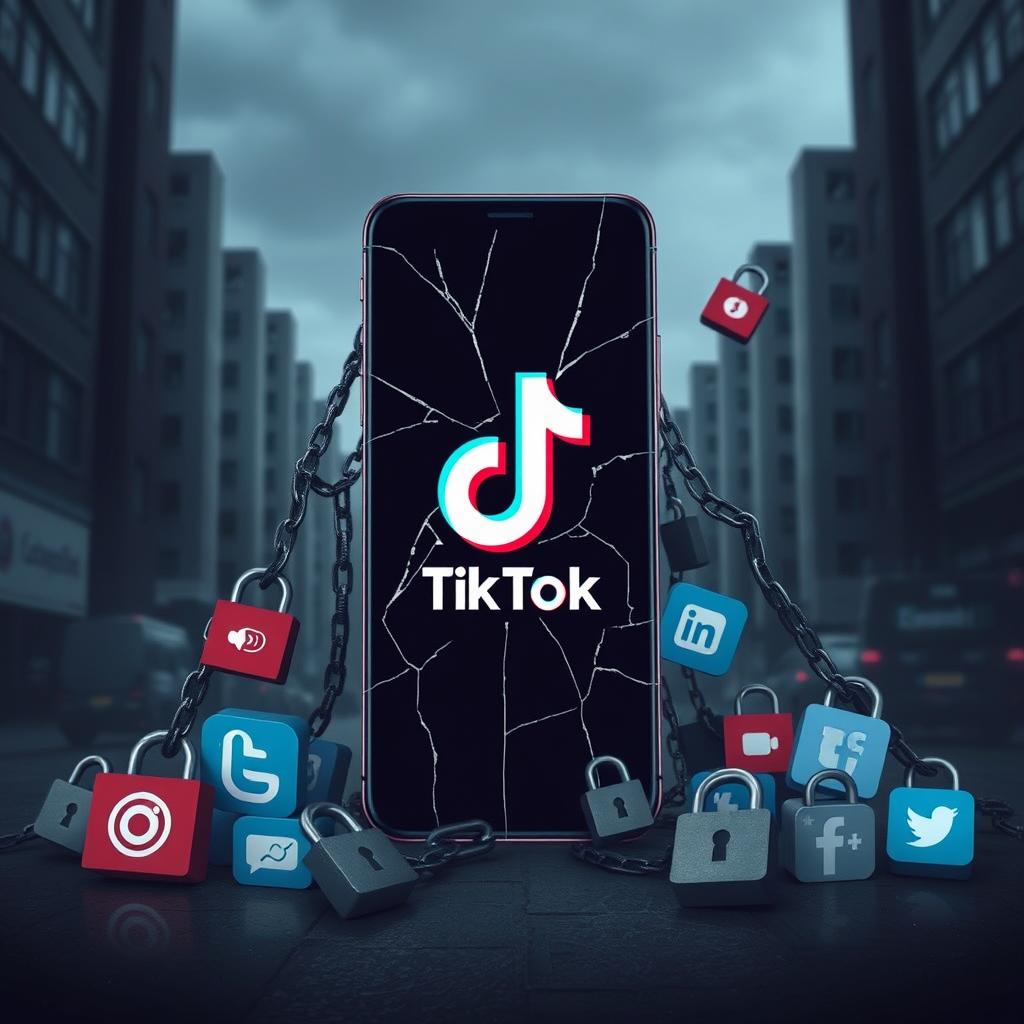Could the TikTok ban start a trend of more social media censorship in the US? The popular video app might soon be removed from American app stores. This raises big questions about the future of the internet and free speech online.
The TikTok controversy has sparked a heated debate. It’s about user privacy, national security, and social media’s role in our lives. With millions of American users and creators affected, the ban’s impact could change the social media world.
The TikTok saga is important to understand. It affects American social media users, creators, and other platforms. Will this ban lead to more online restrictions, or will it make social media safer and more open?
Let’s explore why TikTok was banned, its effects on users and creators, and what it means for social media rules and free speech online.
The Rise and Fall of TikTok in the US
TikTok’s growth in the US has been amazing. It quickly became popular with its short videos and creative tools. This drew in millions of users, especially the young.
The app became a place for viral trends and memes. This made it a top choice in app stores.

The story of TikTok’s rise in the US shows the power of new tech and user content. Its algorithm made content that users couldn’t stop watching. This kept them coming back for more.
TikTok also helped new influencers and creators find fame. They made money and gained fans through the app.
But, TikTok’s success was not without controversy. Its Chinese ownership raised concerns about national security. There were worries about data privacy and content moderation.
These issues led to the US government considering a ban. This ban was due to national security concerns.
The ban threat has made TikTok’s future in the US uncertain. Despite its huge popularity, its future is unclear. The TikTok story shows how tech, politics, and security mix in today’s world.
Reasons Behind the TikTok Ban
The idea of banning TikTok in the US has caused a lot of debate. It raises questions about the future of social media. At the center of this issue are china tech tensions, national security worries, and concerns about user privacy.

US officials are worried about the Chinese government getting access to American users’ data through TikTok. This fear comes from China’s laws that require companies to share data with the government. The fear of user data collection has made people look closely at TikTok’s data handling.
National Security Concerns
The main reason for the TikTok ban is fear of espionage or propaganda by the Chinese government. US officials are concerned that TikTok’s data could be used to track Americans. They worry it could also gather intel on US military and government workers.
Data Privacy Issues
The TikTok ban also shows how important data security is today. More and more people are worried about how their personal info is used online. The risk of foreign governments getting this data has made people demand better privacy and security.
Impact on TikTok Users and Creators
The possible TikTok ban in the US has left many users and content creators worried about their favorite app’s future. TikTok has over 100 million active users in the US, making it a key place for creativity and fun. Now, creators are looking for alternative platforms to share their talents and stay online.

TikTok has been a big start for many stars, helping them grow their fan base and get big deals. The thought of losing TikTok has led to a rush to find new places to grow and connect. User migration to sites like Instagram Reels, YouTube Shorts, and Triller is starting, as creators try to spread their online reach and lessen the ban’s impact.
Alternatives for Content Creators
With TikTok’s future uncertain, content creators are looking at different alternative platforms to keep in touch with their fans. Instagram Reels, launched in August 2020, is a top pick, offering short videos and a huge user base. YouTube Shorts also offers a chance to reach YouTube’s huge audience and make money. Triller and Likee are trying to grab TikTok talent, too, by offering short video options.
User Reactions and Sentiments
Users have mixed feelings about the possible TikTok ban. Some are sad to lose their favorite app, while others support the ban for data privacy and security reasons. People are sharing their thoughts on social media, using hashtags like #SaveTikTok and #BanTikTok. As things develop, it’s unclear how user migration will change social media and if TikTok’s content creators will thrive on alternative platforms.
Geopolitical Implications of the Ban
The TikTok ban is more than a fight over a popular app. It shows the growing us-china relations strain and the tech trade war. The ban on TikTok highlights the rising international tensions between the U.S. and China.
The U.S. government banned TikTok due to data privacy and national security concerns. TikTok is owned by ByteDance, a Chinese company. This move has sparked debates about foreign-owned tech companies in the U.S. and the risks to American users’ data.
China sees the ban as political manipulation and a breach of free-market principles. The country has threatened to retaliate against U.S. companies in China. This has escalated the tech trade war between the two nations.
The TikTok ban raises questions about future tech collaboration and investment across borders. As us-china relations worsen, the ban could lead to a more divided global tech scene. This could increase international tensions.
The Role of Social Media in Free Speech and Expression
The TikTok ban in the United States has sparked a heated debate. It’s about the role of social media in free speech and expression. These platforms are key in shaping public discourse. They must balance free speech with content moderation to stop harmful content.
The TikTok ban shows the complex relationship between social media and free speech. These platforms let people express themselves freely. They also help connect people with similar interests and beliefs.
Balancing Free Speech and Content Moderation
However, online censorship and content moderation raise concerns. Some say too much moderation stifles free speech. Others believe moderation is needed to protect against harmful content.
Censorship Concerns in the Digital Age
The TikTok ban is not just about individual rights. It has big geopolitical implications. It raises questions about government control over social media. It also shows the need for transparency and accountability in content moderation.
Lessons Learned from the TikTok Ban
The TikTok ban in the United States has started a big talk about social media rules. We need to think about what we learned from this event. It helps us understand how to handle data privacy and platform openness better.
One important thing we learned is the need for better data privacy laws. People worry about how their data is used and shared. Social media sites must protect our personal info better. This means having strong privacy rules and letting users control their data.
Another key lesson is the value of being open about how platforms work. Social media companies should share how they handle data and content. This builds trust and helps stop false information from spreading. Being open is key for a healthy online world.
The TikTok ban also shows we need smarter ways to deal with content. It’s important to keep users safe without blocking too much. Social media regulation must find a balance between safety and freedom of speech. Working together is key to making good rules for content.
Looking ahead, the TikTok ban teaches us a lot about social media’s future. By focusing on data privacy, openness, and smart content rules, we can make the internet safer for everyone.
The Future of Social Media Regulation
The TikTok ban in the United States has started a big talk about social media rules. Governments and tech companies are facing new challenges in the fast-changing digital world. It’s clear that big changes are coming.
We can expect big changes in social media policies. After the TikTok ban, many platforms will look at their data privacy, content rules, and user safety. They might make stricter rules about data use and sharing. They will also focus more on being open and responsible.
Another important thing is government regulation. Lawmakers worldwide are looking closely at social media’s effects on society. We’ll see stronger laws to protect privacy, fight fake news, and ensure fair competition in tech.
Collaboration Between Governments and Tech Companies
One big thing after the TikTok ban is more tech industry collaboration with governments. Both sides see the need for a better way to handle social media. They can work together to make rules that help users while still growing the tech world.
Opportunities for Emerging Social Media Platforms
The ban on TikTok in the US has opened doors for new social media platforms. Users and creators are looking for alternatives. This gives new platforms a chance to grow and become big players.
New platforms can stand out by offering unique features. They can focus on specific markets or provide special tools for making and sharing content. This attracts users seeking something new and exciting.
Filling the Gap Left by TikTok
With TikTok’s uncertain future in the US, emerging platforms have a great chance to step up. They can offer similar short videos and easy editing tools. This draws in TikTok users looking for a new place to share their creativity.
By building a strong community and encouraging interaction, these platforms can gain a loyal following. As they keep improving, they could change how we make and watch content online.
Protecting User Data in the Age of Social Media
The TikTok ban controversy has highlighted the need for user privacy and data protection. Social media plays a big role in our lives, making it crucial to keep personal info safe. It’s important for users and companies to focus on data security and hold social media giants accountable.
Best Practices for Safeguarding Personal Information
To keep your privacy safe online, be careful about what you share on social media. Check your privacy settings often and share less personal info. Be smart about app permissions and use strong, unique passwords for each account. Enable two-factor authentication when you can.
By following these steps, you can lower the risk of your data being misused.
The Responsibility of Social Media Companies
Social media companies must also protect user privacy. They should use strong security like end-to-end encryption to keep data safe. It’s key to be open about how they collect and use data, so users can make smart choices.
Companies must also quickly fix data breaches and tell users right away. By focusing on privacy and being responsible with data, social media can be a safer place for everyone.







